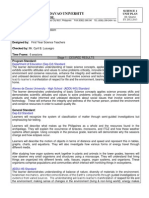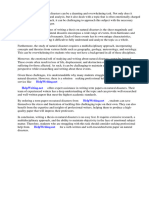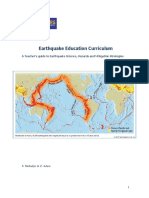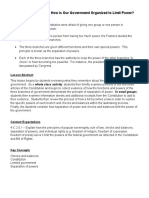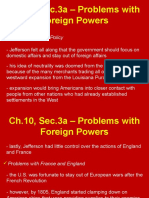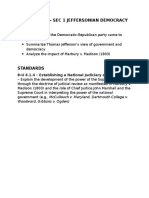Lesson 7 Abstract
Uploaded by
api-134134588Lesson 7 Abstract
Uploaded by
api-134134588Unit 2 - Lesson 7: Investigating Global Events: Natural Hazards
Big Ideas of the Lesson
The Earth is a dynamic place. The natural physical processes that created the Earths
physical features continue to affect Earth and its people.
Natural physical processes are events that happen in nature and can be explained
scientifically.
Natural processes can be related to air, water, earth, or fire. Societies throughout time
have referred to these as the four elements to explain the natural world.
When natural physical processes are unpredictable and result in extreme events, they
are considered natural hazards. Some examples of natural hazards are tornadoes,
tsunamis, tropical cyclones, earthquakes, volcanic eruptions, floods, droughts,
landslides, and wildfires.
The questions of geographic inquiry can help us better understand natural hazards and
the challenges they present to humans.
Lesson Abstract:
In this lesson students explore the causes and effects of a variety of natural hazards. They engage
in a list-sort-label activity to access prior knowledge about natural hazards. Students explore how
natural processes can result in natural hazards. Through a PowerPoint presentation on tornadoes,
students further develop their note taking skills. Students then work in pairs to research one of the
following natural hazards: tsunamis, tropical cyclones, volcanoes, or earthquakes. Using a jigsaw
method, student form expert groups to share and summarize information on the four topics. They
then revisit their grouping and compare them to how people in earlier times thought about their
environment by separating processes into four elements: air, earth fire, and water. This lesson
effectively integrates with science by categorizing natural hazards into lithosphere, atmosphere,
biosphere, and hydrosphere.
Content Expectations: 6 G1.2.4; G2.1.2; and G5.2.1
Common Core State Standards for Literacy in History/Social Studies: RH.6-8.2;
WHST.6-8.7 and 9
Key Concepts
global
natural hazards
human/environment interaction
human vs. physical geography/features
natural or physical processes
You might also like
- The Nature, Structure, and Content of The K To 12 Science Curriculum100% (7)The Nature, Structure, and Content of The K To 12 Science Curriculum23 pages
- Student Awareness On Global Warming (To Be Conducted) PDFNo ratings yetStudent Awareness On Global Warming (To Be Conducted) PDF12 pages
- Ateneo de Davao University High School: Science 1 Unit PlanNo ratings yetAteneo de Davao University High School: Science 1 Unit Plan3 pages
- Natural Hazards and Climate Change: What Knowledge Is Transferable?No ratings yetNatural Hazards and Climate Change: What Knowledge Is Transferable?20 pages
- Learning Outcomes: College of Arts and SciencesNo ratings yetLearning Outcomes: College of Arts and Sciences5 pages
- ELS Q1 M16 Geologic Processes and Hazards 2 RNo ratings yetELS Q1 M16 Geologic Processes and Hazards 2 R13 pages
- The Geologic and Hydrometeorologic Hazards of Sitio MainantangNo ratings yetThe Geologic and Hydrometeorologic Hazards of Sitio Mainantang6 pages
- Earth and Life Science: Quarter 2 - Module 2: Natural HazardsNo ratings yetEarth and Life Science: Quarter 2 - Module 2: Natural Hazards23 pages
- Communicating Climate-Change and Natural Hazard Risk and Cultivating Resilience - Case Studies For A Multi-Disciplinary ApproachNo ratings yetCommunicating Climate-Change and Natural Hazard Risk and Cultivating Resilience - Case Studies For A Multi-Disciplinary Approach332 pages
- GSTS 212 Env and Sustainable Dev. Modules-1-1No ratings yetGSTS 212 Env and Sustainable Dev. Modules-1-180 pages
- Republic of The Philippines State Universities and Colleges: Guimaras State College Graduate School Buenavista, GuimarasNo ratings yetRepublic of The Philippines State Universities and Colleges: Guimaras State College Graduate School Buenavista, Guimaras4 pages
- Presenation On What Is Natural Environment What Is The Human Impact and Influence On EnvironmentNo ratings yetPresenation On What Is Natural Environment What Is The Human Impact and Influence On Environment12 pages
- Disaster Readiness and Risk Reduction: Nelia S. Raganas, Ph.D. FacilitatorNo ratings yetDisaster Readiness and Risk Reduction: Nelia S. Raganas, Ph.D. Facilitator24 pages
- The International Earth Science Olympiad (IESO) : Goals, Objectives and SyllabusNo ratings yetThe International Earth Science Olympiad (IESO) : Goals, Objectives and Syllabus10 pages
- Climate Change & Ecosystems: Lesson PlanNo ratings yetClimate Change & Ecosystems: Lesson Plan7 pages
- 9. Grattan y Torrence - 2007 - Beyond Gloom and Doom the Long-Term ConsequencesNo ratings yet9. Grattan y Torrence - 2007 - Beyond Gloom and Doom the Long-Term Consequences18 pages
- Disaster Science:: Understanding Hazards and DisastersNo ratings yetDisaster Science:: Understanding Hazards and Disasters6 pages
- Earth and Atmospheric Disaster Management Natural and Man-madeFrom EverandEarth and Atmospheric Disaster Management Natural and Man-madeNo ratings yet
- DRRR - Module 3 - Concept of Hazards-Navidad-JanreyNo ratings yetDRRR - Module 3 - Concept of Hazards-Navidad-Janrey4 pages
- Assessment of Environmental Literacy, Concern and Disaster Preparedness Among College StudentsNo ratings yetAssessment of Environmental Literacy, Concern and Disaster Preparedness Among College Students11 pages
- STEM Gonzales Kerwwyn Gray Earthquake Drill Complete Paper FINAL EXAM in RESEARCH 2No ratings yetSTEM Gonzales Kerwwyn Gray Earthquake Drill Complete Paper FINAL EXAM in RESEARCH 232 pages
- Science, Technology, Engineering, and MathematicsNo ratings yetScience, Technology, Engineering, and Mathematics8 pages
- Immediate download Social Vulnerability to Disasters 2nd Thomas Solution Manual all chapters100% (20)Immediate download Social Vulnerability to Disasters 2nd Thomas Solution Manual all chapters47 pages
- What Is Our Purpose?: Planning The InquiryNo ratings yetWhat Is Our Purpose?: Planning The Inquiry5 pages
- CH 10 Sec 3 Problems With Foreign PowersNo ratings yetCH 10 Sec 3 Problems With Foreign Powers10 pages
- Unit 1: Foundations of A New Nation: Eighth Grade Social Studies: Integrated United States HistoryNo ratings yetUnit 1: Foundations of A New Nation: Eighth Grade Social Studies: Integrated United States History5 pages
- Chapter 10 - The Jefferson Era 1800-1816 Key IdeasNo ratings yetChapter 10 - The Jefferson Era 1800-1816 Key Ideas1 page
- Unit 2: Challenges To An Emerging Nation: Eighth Grade Social Studies: Integrated United States HistoryNo ratings yetUnit 2: Challenges To An Emerging Nation: Eighth Grade Social Studies: Integrated United States History4 pages
- CH 10 Sec 2 The Louisiana Purchase and Exploration 1No ratings yetCH 10 Sec 2 The Louisiana Purchase and Exploration 112 pages
- Class Notes: Legacy of The War: American VictoryNo ratings yetClass Notes: Legacy of The War: American Victory36 pages






